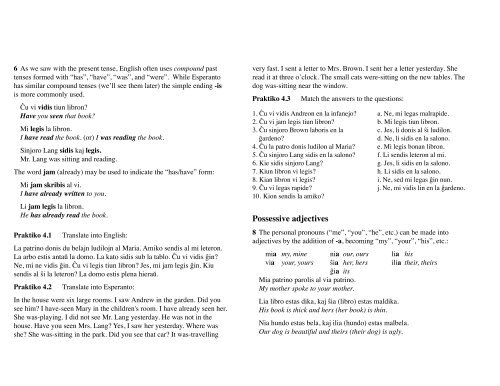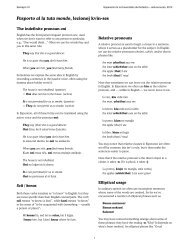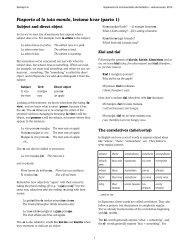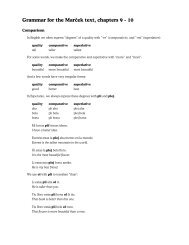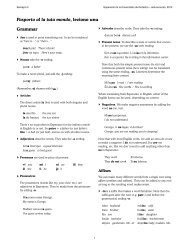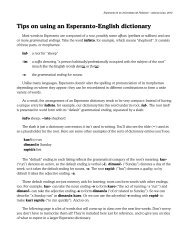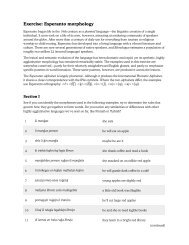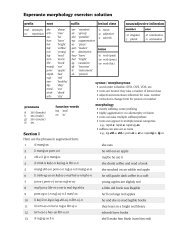The alphabet and pronunciation - Lodestone
The alphabet and pronunciation - Lodestone
The alphabet and pronunciation - Lodestone
- No tags were found...
You also want an ePaper? Increase the reach of your titles
YUMPU automatically turns print PDFs into web optimized ePapers that Google loves.
6! As we saw with the present tense, English often uses compound pasttenses formed with “has”, “have”, “was”, <strong>and</strong> “were”. While Esperantohas similar compound tenses (we’ll see them later) the simple ending -isis more commonly used.! "u vi vidis tiun libron?! Have you seen that book?! Mi legis la libron.! I have read the book. (or) I was reading the book.! Sinjoro Lang sidis kaj legis.! Mr. Lang was sitting <strong>and</strong> reading.<strong>The</strong> word jam (already) may be used to indicate the “has/have” form:! Mi jam skribis al vi.! I have already written to you.! Li jam legis la libron.! He has already read the book.Praktiko 4.1!Translate into English:La patrino donis du belajn ludilojn al Maria. Amiko sendis al mi leteron.La arbo estis anta# la domo. La kato sidis sub la tablo. "u vi vidis $in?Ne, mi ne vidis $in. "u vi legis tiun libron? Jes, mi jam legis $in. Kiusendis al %i la leteron? La domo estis plena hiera#.Praktiko 4.2!Translate into Esperanto:In the house were six large rooms. I saw Andrew in the garden. Did yousee him? I have-seen Mary in the children's room. I have already seen her.She was-playing. I did not see Mr. Lang yesterday. He was not in thehouse. Have you seen Mrs. Lang? Yes, I saw her yesterday. Where wasshe? She was-sitting in the park. Did you see that car? It was-travellingvery fast. I sent a letter to Mrs. Brown. I sent her a letter yesterday. Sheread it at three o’clock. <strong>The</strong> small cats were-sitting on the new tables. <strong>The</strong>dog was-sitting near the window.Praktiko 4.3!Match the answers to the questions:1. "u vi vidis Andreon en la infanejo?2. "u vi jam legis tiun libron?3. "u sinjoro Brown laboris en la$ardeno?4. "u la patro donis ludilon al Maria?5. "u sinjoro Lang sidis en la salono?6. Kie sidis sinjoro Lang?7. Kiun libron vi legis?8. Kian libron vi legis?9. "u vi legas rapide?10. Kion sendis la amiko?Possessive adjectivesa. Ne, mi legas malrapide.b. Mi legis tiun libron.c. Jes, li donis al %i ludilon.d. Ne, li sidis en la salono.e. Mi legis bonan libron.f. Li sendis leteron al mi.g. Jes, li sidis en la salono.h. Li sidis en la salono.i. Ne, sed mi legas $in nun.j. Ne, mi vidis lin en la $ardeno.8! <strong>The</strong> personal pronouns (“me”, “you”, “he”, etc.) can be made intoadjectives by the addition of -a, becoming “my”, “your”, “his”, etc.:! mia! my, mine ! nia! our, ours! lia! his! via! your, yours! %ia! her, hers! ilia! their, theirs! ! ! $ia! its! Mia patrino parolis al via patrino.! My mother spoke to your mother.! Lia libro estas dika, kaj %ia (libro) estas maldika.! His book is thick <strong>and</strong> hers (her book) is thin.! Nia hundo estas bela, kaj ilia (hundo) estas malbela.! Our dog is beautiful <strong>and</strong> theirs (their dog) is ugly.


